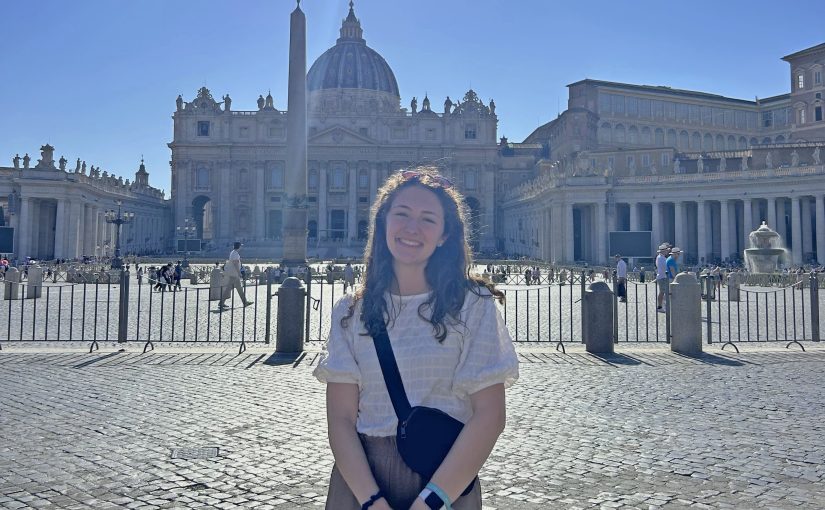By Maddie Colbert
Editor’s note: Maddie Colbert, a Notre Dame junior majoring in global affairs and theology, took the three-week summer course Catholic Approaches to War and Peace: the View from Rome. The course is taught by Keough School professor Jerry Powers at Notre Dame Rome. In the blog post below, Maddie reflects on her experience.
As my classmates and I stood with the congregation at the Basilica di Santa Maria in Rome’s Trastevere neighborhood for evening prayer, I was overwhelmed with gratitude and struck by the beauty of the community praying together. We had just been given a tour of the Community of Sant’ Egidio headquarters by Elizabeth Boyle (MGA ‘23, BA ’20), who described the community’s mission as “the three p’s:” prayer, poverty and peace.
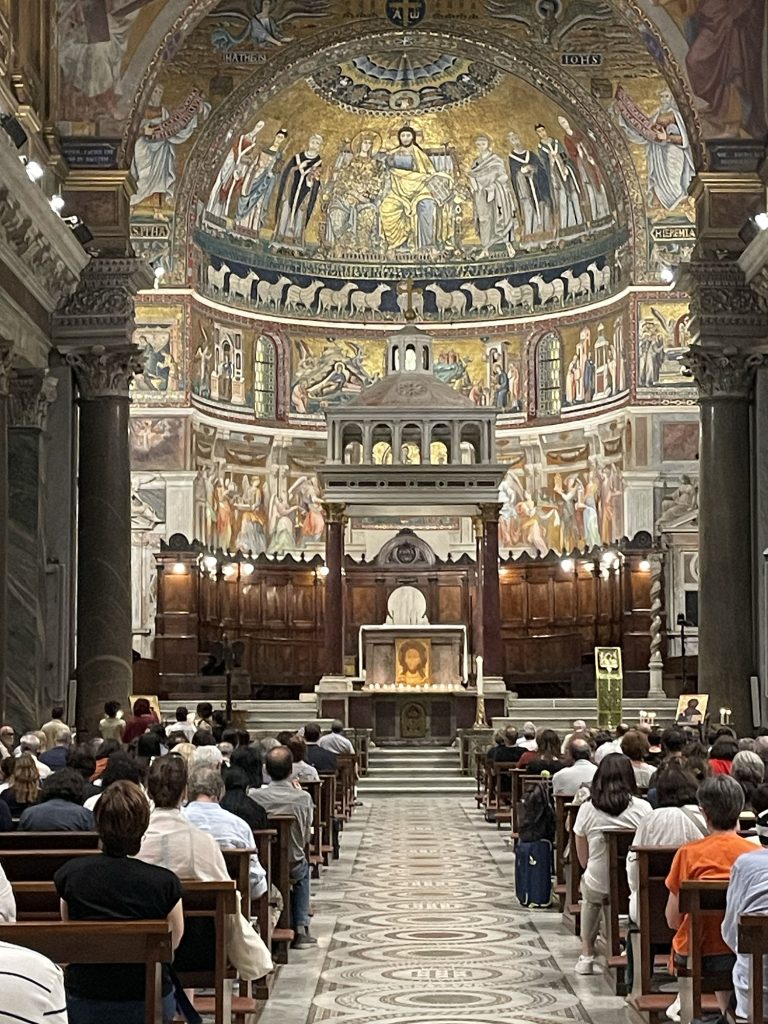
Sant’Egidio expanded their initial mission of befriending the poor to include peacebuilding and negotiation, operating from the conviction that “war is the mother of all poverty.” The Sant’Egidio approach prioritizes building personal relationships and understanding the culture of those they work with, as well as conversations with state and non-state actors to hear various perspectives. Sant’Egidio’s patient, personal approach creates a safe space for peace talks away from outside interferences. Similarly, their work with the poor and vulnerable emphasizes friendship and encounter, rather than viewing those living in poverty as a burden.
After evening prayer, our class had dinner with Elizabeth at Sant’ Egidio’s restaurant, Trattoria degli Amici. The restaurant is run by those Sant’Egidio has befriended in the community, including people with various disabilities who work alongside professionals and friends who help voluntarily.
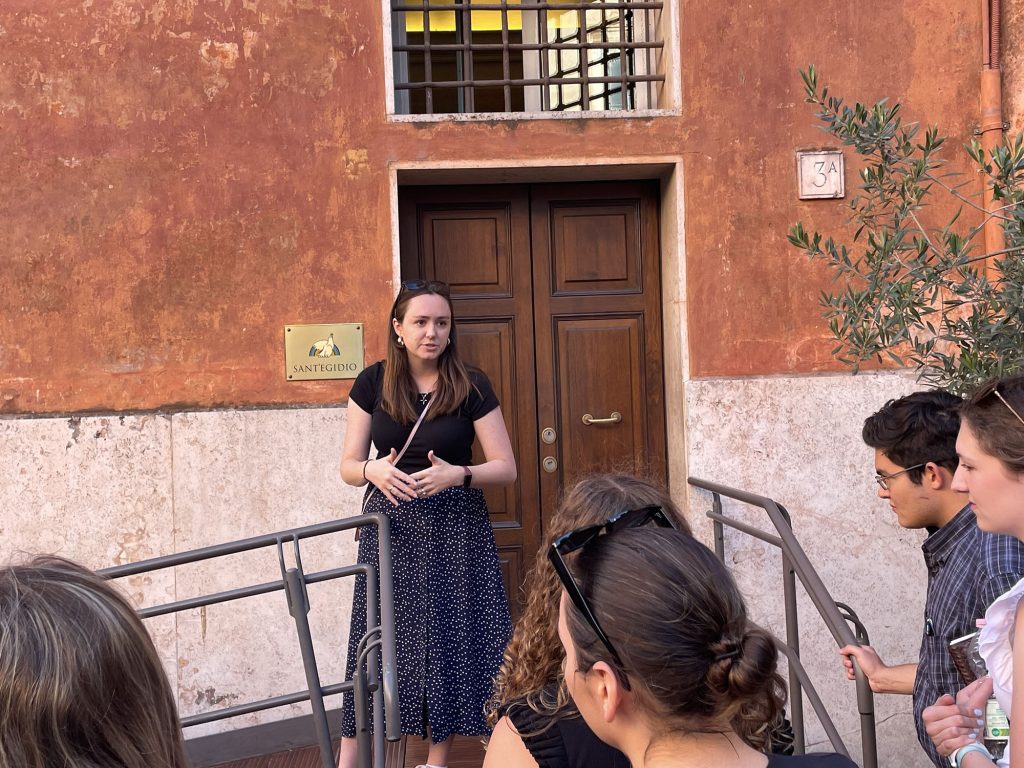
In our class at Notre Dame Rome we discussed integral human development — the care of every person and the whole person — and its foundation in human dignity. Promoting integral human development is to promote a more peaceful and just society. As a truly global institution, the Catholic Church must find ways to address global Church-related issues while also uplifting local Church leadership. Our instructor, Professor Jerry Powers, explained the importance of integrating different levels of engagement in peacebuilding work to connect grassroots efforts with the national and international levels.
As part of our class we also visited the Dicastery for Promoting Integral Human Development, a Vatican department created by Pope Francis in 2017. From dicastery staff we learned how subsidiarity — authority operating at the lowest level possible and the highest level necessary — can be instrumental in developing solutions to local challenges while also remaining connected to the universal Church. Dr. Gabriele Verga, who leads the research and reflection department of the dicastery, explained to us the importance of dialogue with the national bishops’ conferences to identify regional or multi-regional issues. After an issue is identified, the dicastery conducts research to later provide the bishops with recommendations so they can implement solutions based in the context of their diocese.
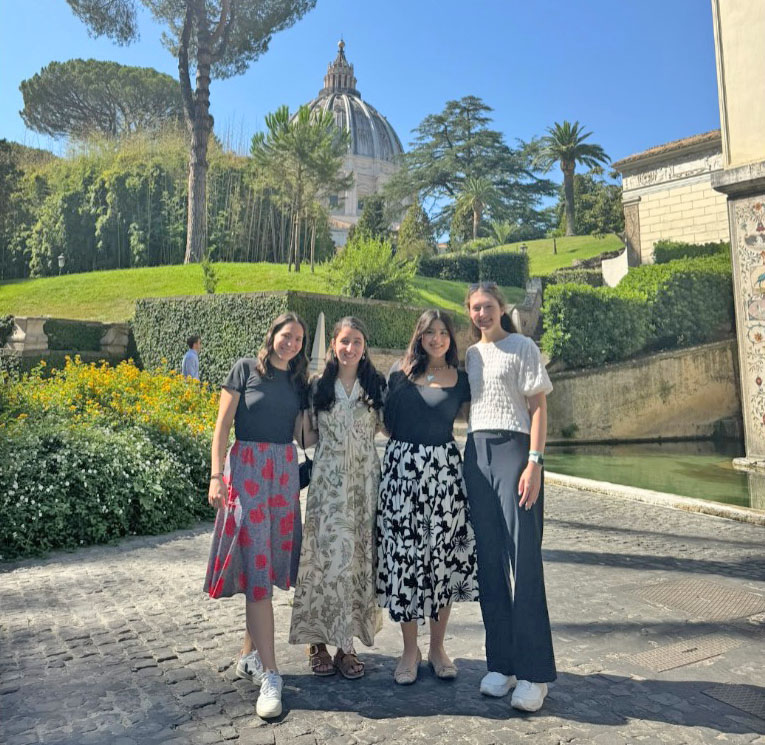
The dicastery’s emphasis on subsidiarity promotes dialogue that includes Catholic voices at every level. Although the Church certainly faces challenges in promoting integral human development, its advocacy work is guided by a shared understanding of the importance of human dignity.
In our class we continued to discuss the many approaches to peacebuilding and how the Church engages with the modern secular society. In a world where science and technology can be weaponized, used as a Band-Aid solution for development issues or, more positively, channeled to uphold the dignity of the human person, having conversations about scientific advancement is vital to building peace.
Despite a general critique of technocratic solutions to issues, the Church does embrace modern science and technological advancements. We discussed this perspective during a visit with Cardinal Peter Turkson, chancellor of both the Pontifical Academy of Sciences and the Pontifical Academy of Social Sciences, in his Vatican office. We talked about the importance of having conversations about the ethical use of technologies, especially those that could potentially “replace” the human agent, like generative AI. The pontifical academy seeks to include both Catholic and non-Catholic scientific experts from all over the world in these dialogues while also staying rooted in the teachings of the Church.
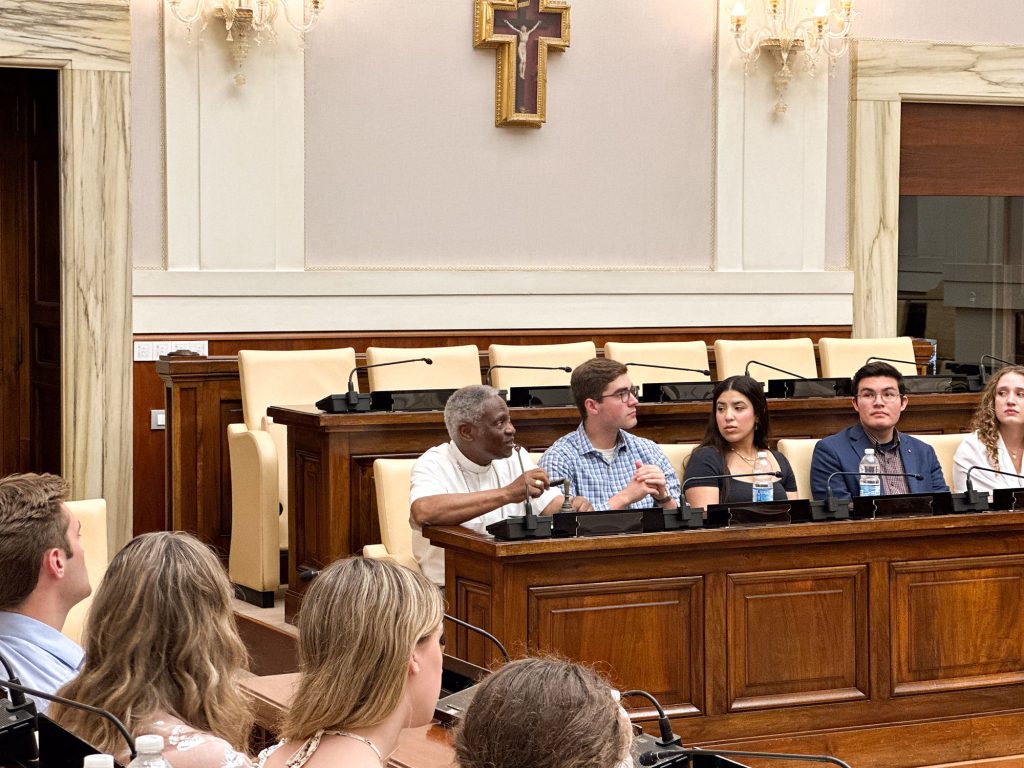
Cardinal Turkson emphasized that faith and science can coexist and support one another, but also that technology can either uplift human dignity or create a “dignity deficit.” He spoke about the intersection of traditional Church teaching and the modern world: “Faith should be rooted, but never stagnant.” Recognizing both the importance of staying rooted in faith and responding to current events and human needs, we are reminded that faith equips us to respond to the needs of our world.
Before our conversation with Cardinal Turkson, we had the amazing opportunity to have a tour of the Vatican Gardens and the historic offices just behind the Vatican Museum, given by Cardinal Turkson himself. I thought it was a perfect illustration of his earlier point: the office of the Pontifical Academy of Sciences is housed in a historic building, full of beautiful artwork and pictures: a reminder that scientific advancement is meant to be in conversation with tradition, history and faith.
During our final class meeting we talked with Professor Cenap Aydin, a Muslim scholar-activist specializing in interreligious dialogue, from the global movement Religions for Peace. We discussed how interreligious dialogue can be productive for bringing communities together because of the benefits of exchanging one’s deeply held beliefs. The professor emphasized that Catholicism and other faiths encourage dialogue with the “other” because of their shared humanity, and that true respect and appreciation for another can be seen in the fight for religious freedom, which comes not from a historical event or law, but from our human dignity. Interreligious dialogue can help create tolerance and appreciation for other faiths and their lifestyles, building a stronger pathway for peace.
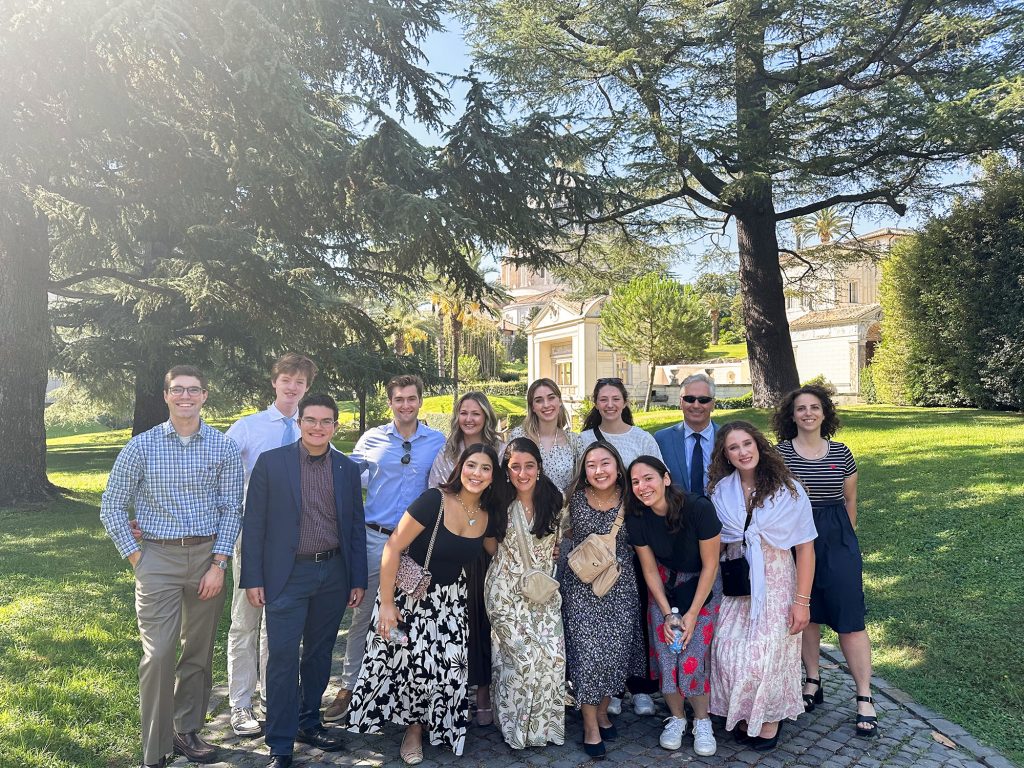
Notre Dame students visiting Vatican City as part of their 3-week summer course Catholic Approaches to War and Peace: the View from Rome.
In Fratelli Tutti, Pope Francis emphasizes recognizing charity (or love) as the core of politics, through which we can prioritize human dignity in our search for peace (Fratelli Tutti, 187-189). At the center of the Church’s peacebuilding mission is the conviction that we are one human family, and the dialogue taking place in these organizations seeks to uplift the human dignity that we share. I hope to take part in the Church’s peacebuilding mission, starting at home by promoting dialogue and a culture of encounter.
Related links:
• Summer Rome course explores Catholic Church’s impact on war and peace
• From Italy to South Sudan and back again: MGA graduate aims for peace through shuttle diplomacy

